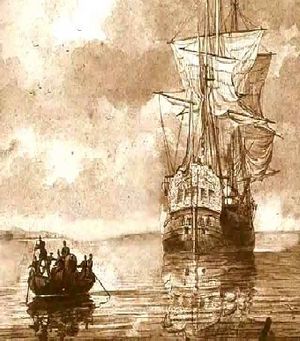French ship Oriflamme (1744) facts for kids
 |
|
Quick facts for kids History |
|
|---|---|
| Name | Oriflamme |
| Ordered | 16 February 1743 |
| Builder | Toulon |
| Laid down | April 1743 |
| Launched | 30 October 1744 |
| Commissioned | December 1744 |
| Captured | 1 April 1761, by HMS Isis of the Royal Navy |
| Spain | |
| Name | Oriflama |
| Fate | Lost at sea between 25–28 July 1770 |
| General characteristics | |
| Class and type | 56-gun ship of the line |
| Tons burthen | 1,000 |
| Length | 135 French feet |
| Beam | 37 French feet |
| Draught | 18½ French feet |
| Depth of hold | 17¾ French feet |
| Propulsion | Sails |
| Sail plan | Full-rigged ship |
| Complement | 380 men, + 5/10 officers |
| Armament | 56 guns of various weights of shot (reduced to 50 guns in 1757) |
The Oriflamme was a powerful warship with 56 guns, built for the French Navy. She was ordered in 1743 and launched in 1744 from Toulon Dockyard in France. This type of ship was called a ship of the line, meaning it was large enough to fight in the main battle line of a navy.
The ship was named after the oriflamme, which was a famous red battle flag used by French kings long ago. Oriflamme was designed to carry many cannons. She had 24 large guns on her lower deck and 26 smaller ones on her upper deck. She also had 6 even smaller guns, but these were removed later when the ship was updated.
Contents
Oriflamme: A French Warship
Oriflamme's journey began as a French warship. She was involved in several important events during her time with the French Navy.
Early Adventures
On 16 April 1746, Oriflamme helped to get back a French ship called Volage. This ship had been captured by a British warship just the day before.
During the Seven Years' War, Oriflamme had a close call with the Royal Navy (the British Navy). In February 1758, two larger British warships, HMS Montagu and HMS Monarch, chased Oriflamme near the coast of Spain.
The British ships chased Oriflamme until she ran aground, meaning she got stuck on the shore. However, Spain was neutral at that time, so the British ships did not try to destroy her. Oriflamme was later pulled free and repaired.
Captured by HMS Isis
Oriflamme met the British again on 1 April 1761. This time, she was chased by the 50-gun HMS Isis near the coast of Morocco. The two ships began fighting at 6 PM.
The captain of Isis, Edward Wheeler, was sadly killed early in the battle. Command then went to Lieutenant Cunningham. When he saw that Oriflamme was trying to escape, he bravely sailed Isis right next to her. This forced the French ship to surrender.
During this battle, Oriflamme was carrying about 40 to 50 guns. She had 50 sailors killed or wounded out of her crew of about 370. Isis had four sailors killed, including her captain, and nine wounded. The captured Oriflamme was then taken to Gibraltar.
Oriflamme: A Spanish Merchant Ship
After being captured, Oriflamme was not used by the British Navy. Instead, she was sold to a company that used her as a merchant ship. She then seems to have been used by Spain, where she was known as Oriflama.
The Final Voyage
Oriflama began her last journey on 18 February 1770, sailing from Cadiz, Spain. She was commanded by Captain Joseph Antonio de Alzaga.
On 25 July, another ship, the Gallardo, spotted Oriflama. The captain of the Gallardo knew Captain de Alzaga. The Gallardo fired a cannon shot to get Oriflama's attention, but there was no answer.
An officer from the Gallardo went to investigate. He found that a terrible sickness had swept through Oriflama's crew. Half of the sailors had already died, and the rest were very ill. Only about thirty men were barely strong enough to handle the sails.
The officer returned to his ship, and supplies were prepared for Oriflama. However, bad weather separated the ships, and the Gallardo could not catch up. It was said that a strange light lit up Oriflama's sails as she sailed away into the night.
On 28 July, parts of Oriflama and some bodies were found washed up on the coast of Chile. This showed that the ship had been lost at sea.
Search for the Wreck
The next spring, the Viceroy of Peru, Manuel de Amat y Juniet, sent divers to search for the wreck of Oriflama. However, the search was called off in January 1772, and the ship's remains were never found.
Images for kids
See also
 In Spanish: Nuestra Señora del Buen Consejo y San Leopoldo (1743) para niños
In Spanish: Nuestra Señora del Buen Consejo y San Leopoldo (1743) para niños
 | James B. Knighten |
 | Azellia White |
 | Willa Brown |

